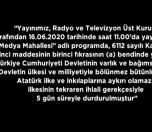Click to read the article in Turkish
The Radio and Television Supreme Council (RTÜK) issued an excessive amount of monetary penalties on TV outlets critical of the government in 2020 while mostly skipping complaints against pro-government ones, according to a member of the council.
Pro-government broadcasters paid a total of 400,000 lira (~53,500 USD) of fines whereas several outlets critical of the government paid 25 times more with 10 million lira (~1.33 million USD), said İlhan Taşcı, an RTÜK member from the main opposition Republican People's Party (CHP).
The RTÜK is a formally independent agency formed by political parties in the parliament in proportion to the number of lawmakers they have.
It has long been criticized by opposition parties and rights groups for being used as an instrument to punish critical broadcasting.
CLICK - HRW: Turkey's media authority imposing punitive sanctions on critical media outlets
The Council didn't examine a single filing against several pro-government broadcasters —A Haber, Kanal 7, TV Net and TGRT Haber— and examined only two out of 12,500 complaints against ATV throughout the year, Taşcı noted.
ATV, which was the channel that had the highest number of complaints against it, warned once for "vulgar usage of Turkish" and received a monetary fine for "protection of the family," according to the report.
Critical TV outlets received 54 sanctions between January 1 and December 25, which were as follows:
- TELE 1 received 19 penalties, with 16 administrative fines, two broadcast suspensions for eight days and one five-day blackout.
- Halk TV got 12 administrative fines, two broadcast suspension penalties for 10 days and one five-day blackout.
- Fox TV was imposed administrative fines nine times and its main news bulletin was suspended three times.
- KRT received three administrative fines.
"Independent channels are watched more"
Taşcı also noted that Habertürk, a mainstream news channel, was one of the most punished broadcasters despite not being "a direct target" for the RTÜK.
It received one warning, five administrative fines and one of its programs were suspended for five episodes.
Noting that the content produced by all those channels was similar, Taşcı said, "The main difference between these channels is only that some praise the government and some criticize it."
"The message given through the RTÜK is clear: 'I won't make you live, I turn a deaf ear to the public's right to information, I won't make those who criticize the government live, and protect those who are the voice of the palace, overwhelm them with ads," he added.
However, Taşcı noted, the broadcasters that have original content and try to "convey the truth" are watched more than the pro-government broadcasters despite the opportunities provided to them. (HA/VK)






sa.jpg)
-132.jpg)

-132.jpg)




